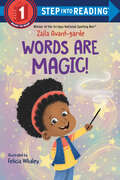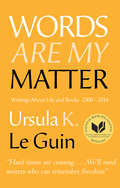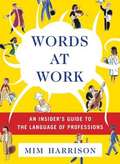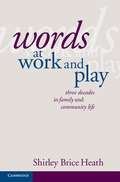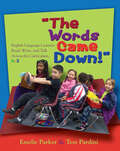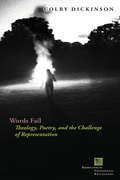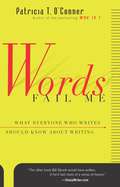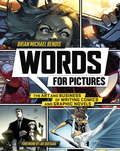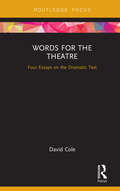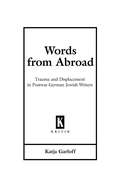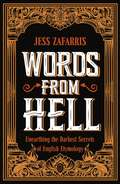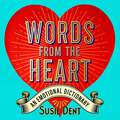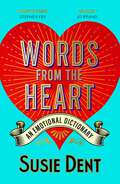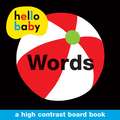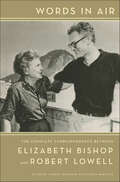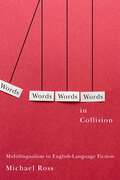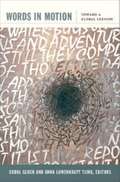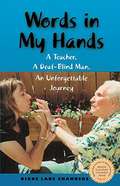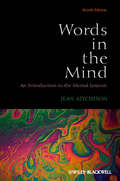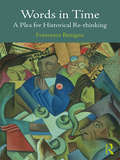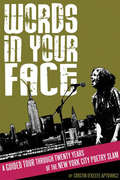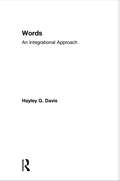- Table View
- List View
Words Are Magic! (Step into Reading)
by Zaila Avant-gardeScripps National Spelling Bee champ Zaila Avant-garde shares her love of words with new readers in this level 1 Step Into Reading book.Words are magic! Have you heard? Pick a letter. Make a word! New readers will find joyful encouragement in this level 1 easy reader that sings out about the magic of words. Encouraging kids to mix words, match words, shout and rap words, Scripps National Spelling champ Zaila Avante-garde takes readers along on a noisy and boisterous celebration of letters, sounds, and reading. It's the perfect first step for new readers, full of fun and energy, from one of America's most exciting and unique young voices. Step 1 Readers feature big type and easy words for children who know the alphabet and are eager to begin reading. Rhyme and rhythmic text paired with picture clues help children decode the story.Also available by Zaila Avant-garde:Words of Wonder from Z to AIt's Not Bragging If It's True
Words Are My Matter: Writings About Life and Books, 2000-2016, with a Journal of a Writers Week
by Ursula K. Le GuinThis collection of Ursula K. Le Guin's recent talks, essays, introductions is the best manual we have for exploring the worlds explored in recent fiction; the most useful guide to the country we're visiting, life.
Words at Work: An Insider's Guide to the Language of Professions
by Mim HarrisonA fascinating view into the arcane nature of the workplace, Words at Work delves into fifteen professions--both ordinary and extraordinary--to discover the unique and colorful vocabulary that gives them their energy. The occupations are eclectic, from every day jobs like waste manager to singular positions like symphony orchestra musician; but the connections between words--which make you feel as though you're having a conversation with someone in the know--and Mim Harrison's skills as a writer, give readers an uncommon and highly perceptive glimpse into each of these worlds. Now you'll know what it means when the musician sheds the part(practices the music), the airline pilot mentions thewing walkers (the gate crew that guides your plane to a stop) and the waste manager yells out white goods (an appliance like a stove or refrigerator that is destined for the trash heap). Harrison is captivated by the singular vocabularies of these occupations and she shares her fascination with readers. Whether you're a linguaphile who has always been curious about the lingoes attached to professions, or starting out in one of the occupations and hoping to get a leg up on the vocabulary,Words at Work will both charm and educate. Mim Harrison has a unique ear for language, and a gifted light touch as a writer. That combination makes Words at Work a highly original entry in the crowded field of language books.
Words at Work and Play
by Shirley Brice HeathChildhood and family life have changed significantly in recent decades. What is the nature of these changes? How have they affected the use of time, space, work and play? In what ways have they influenced face-to-face talk and the uses of technology within families and communities? Eminent anthropologist Shirley Brice Heath sets out to find answers to these and similar questions, tracking the lives of 300 black and white working-class families as they reshaped their lives in new locations, occupations and interpersonal alignments over a period of thirty years. From the 1981 recession through the economic instabilities and technological developments of the opening decade of the twenty-first century, Shirley Brice Heath shows how families constantly rearrange their patterns of work, language, play and learning in response to economic pressures. This outstanding study is a must-read for anyone interested in family life, language development and social change.
Words at Work in Vanity Fair
by Martha BantaBanta draws upon essays in Vanity Fair by noted journalists, literary figures, and cultural critics in order to examine the manner by which major cultural and historical events in the Untied States and Britain led to the invention of previously non-existent words to express the rampant changes within society.
Words Came Down!: English Language Learners Read, Write, and Talk Across the Curriculum, K-2
by Emelie Parker Tess PardiniAs teachers everywhere find more and more students with limited English in their classes, many are asking: How can I include ELL students in every aspect of the day? The Words Came Down!: English Language Learners Read, Write, and Talk Across the Curriculum, K-2 oral language is emphasized in a continuum from teacher modeling and demonstration to situations in which student-to-student communication is essential. The authors show that when children's attempts at communicating are accepted and celebrated, they will learn to communicate with each other comfortably and spontaneously whether on the playground or working on a science experiment. Beginning with designing a classroom that welcomes students and creates appropriate conditions for learning, Emelie Parker and Tess Pardini go on to detail a workshop format for reading, writing and content-area studies. The workshop structure allows teachers to differentiate instruction to include all students, and affords students ample opportunities to collaborate with others as they learn to speak, read, write, and comprehend while also engaging in active learning of the curriculum. The authors provide numerous examples of ways that teachers can become proficient in knowing each child and orchestrating instruction to meet individual needs. In addition, this helpful guide offers a variety of approaches to assessment, and demonstrates the importance of engaging families as partners in learning English and content.
Words Fail: Theology, Poetry, and the Challenge of Representation (Perspectives in Continental Philosophy)
by Colby DickinsonThere has been much philosophical speculation on the potential failure of language as well as the search for a presentation of the “thing itself” beyond representation. Words Fail pursues the writings of a trio of philosophers—Jacques Derrida, Philippe Lacoue-Labarthe, and Giorgio Agamben—as prime examples of how modern poetry presents us with a profitable vantage point from which to survey the ongoing struggle of living in a highly fragmented world.Alongside these thinkers, this book looks specifically at the form of spirituality that is given shape by this intersection of poetics and theological-philosophical reflection—all of which offer rich suggestions about our spiritual nature.
Words Fail Me: What Everyone Who Writes Should Know about Writing (Read-On)
by Patricia T. O'ConnerFrom the bestselling author of Woe Is I: A guide to grammar fundamentals that&’s sympathetic to the struggling writer and often just plain funny&” (The Seattle Times). Whether you need to improve your skills for work or school, or aspire to the Great American Novel, a grounding in grammar, spelling, and punctuation is essential—not just to make you look like a professional but to communicate effectively in emails, essays, or anything you need to write. This painless, practical book is filled with short, snappy chapters, crystal-clear examples, and a &“playful sense of humor&” (The New York Times Book Review)—covering everything from &“Pronoun Pileups&” and &“Verbs That Zing&” to &“What to Do When You&’re Stuck.&” With these simple, straightforward tips, you can learn how to sort your thoughts and make sentences that make sense. &“Students writing papers, employees preparing reports, and those who just want to be understood in print may benefit from this fun-to-use answer to Strunk and White. O&’Connor uses humor as she takes apart sentences and their parts and shows how each element is used effectively.&” —Booklist
Words for Pictures
by Brian Michael Bendis Joe QuesadaBest-selling Marvel Comics writer Brian Michael Bendis reveals the comic book writing secrets behind his work on The Avengers, Ultimate Spider-Man, All-New X-Men, and more.Arguably the most popular writer in modern comics, Brian Michael Bendis shares the tools and techniques he uses to create some of the most popular comic book and graphic novel stories of all time. Words for Pictures provides a fantastic opportunity for readers to learn from a creator at the very top of his field. Bendis's step-by-step lessons teach comics writing hopefuls everything they'll need to take their ideas from script to dynamic sequential art. The book's complete coverage exposes the most effective methods for crafting comic scripts, showcases insights from Bendis's fellow creators, reveals business secrets all would-be comics writers must know, and challenges readers with exercises to jumpstart their own graphic novel writing success.
Words for the Theatre: Four Essays on the Dramatic Text (Focus on Dramaturgy)
by David ColeIn Words for the Theatre, playwright David Cole pursues a course of dramaturgical self-questioning on the part of a playwright, centred on the act of playwriting. The book’s four essays each offer a dramaturgical perspective on a different aspect of the playwright’s practice: How does the playwright juggle the transcriptive and prescriptive aspects of their activity? Does the ultimate performance of a playtext in fact represent something to which all writing aspires? Does the playwright’s process of withdrawing to create their text echo a similar process in the theatre more widely? Finally, how can the playwright counter theatre’s pervasive leaning towards the ‘mistake’ of realism? Suited to playwrights, teachers, and higher-level students, this volume of essays offers reflections on the questions that confront every playwright, from an author well-versed in supplying words for the theatre.
Words from Abroad: Trauma and Displacement in Postwar German Jewish Writers (Kritik: German Literary Theory And Cultural Studies Ser.)
by Katja GarloffExamines the responses of German Jewish writers to the geographical and cultural displacement that is one of the lasting consequences of the Holocaust.
Words from Hell: Unearthing the Darkest Secrets of English Etymology
by Jess ZafarrisThe English language is where words go to be tortured and mutilated into unrecognizable shadows of their former selves. It's where Latin, Greek, and Germanic roots are shredded apart and stitched unceremoniously back together with misunderstood snippets of languages snatched from the wreckage of conquest and colonialism. It wreaks merciless havoc upon grammar and spelling. It turns clinical terms into insults and children's tales into filthy euphemisms.With an emphasis on understanding where the foulest words in the English language came from-and the disgusting and hilarious histories behind them-this book demonstrates the true filth of our everyday words. But this book is more than just a list of vulgar words and salacious slang. It's a thoughtful analysis of why we deem words as being inappropriate as well as revealing 'good words' that have surprisingly naughty origins.Dirty-minded word nerds and lewd linguistics lovers will derive unadulterated pleasure in leering at the origins of swear words, sexual lingo, inappropriate idioms, violent vocabulary, and terminology for bodily functions-not to mention the unexpectedly foul origins of words you thought were perfectly innocent. If it's inappropriate, stomach-churning, uncomfortable, or offensive, this book reaches into the dark recesses of history and exposes them for all to see.True to the Chambers brand, this book combines humour, scholarly research and a beautiful design. It is a book to enjoy, collect and revisit time and time again.
Words from Hell: Unearthing the Darkest Secrets of English Etymology
by Jess ZafarrisThe English language is where words go to be tortured and mutilated into unrecognizable shadows of their former selves. It's where Latin, Greek, and Germanic roots are shredded apart and stitched unceremoniously back together with misunderstood snippets of languages snatched from the wreckage of conquest and colonialism. It wreaks merciless havoc upon grammar and spelling. It turns clinical terms into insults and children's tales into filthy euphemisms.With an emphasis on understanding where the foulest words in the English language came from-and the disgusting and hilarious histories behind them-this book demonstrates the true filth of our everyday words. But this book is more than just a list of vulgar words and salacious slang. It's a thoughtful analysis of why we deem words as being inappropriate as well as revealing 'good words' that have surprisingly naughty origins.Dirty-minded word nerds and lewd linguistics lovers will derive unadulterated pleasure in leering at the origins of swear words, sexual lingo, inappropriate idioms, violent vocabulary, and terminology for bodily functions-not to mention the unexpectedly foul origins of words you thought were perfectly innocent. If it's inappropriate, stomach-churning, uncomfortable, or offensive, this book reaches into the dark recesses of history and exposes them for all to see.True to the Chambers brand, this book combines humour, scholarly research and a beautiful design. It is a book to enjoy, collect and revisit time and time again.
Words from the Heart: Real Words for How You Feel, from Angst to Zwodder
by Susie DentWhether it's the distress of a bad haircut (AGE-OTORI) or longing for the food someone else is eating (GROAKING), the pleasure found in other people's happiness (CONFELICITY) or the shock of jumping into icy water (CURGLAFF), there are real words to pinpoint exactly how you feel and Susie Dent, Queen of Countdown's Dictionary Corner and lexicographer extraordinaire, is going to help you find them. Here are 1001 terms everyone needs, whether it's the best kind of hug (CWTCH), the relief found in swearing (LALOCHEZIA), or the ability to endure till the end (PERTOLERANCE). It's time to rediscover the lost positives of language (and be more GORM); find out how a stork gave us the word for the love between parent and child, and who the first MAVERICK was. Packed with unexpected stories and unforgettable words, on a mission to describe the indescribable, this life-enhancing audiobook will deepen your vocabulary as much as it extends it. Welcome to the first truly human dictionary, as idiosyncratic and unusual as you are.(P) 2022 Hodder & Stoughton Limited
Words from the Heart: An Emotional Dictionary
by Susie Dent'MAGIC' JO BRAND'HAPPIFYING' STEPHEN FRY'SUSIE DENT IS A NATIONAL TREASURE' RICHARD OSMANWhether it's the distress of a bad haircut (AGE-OTORI) or longing for the food someone else is eating (GROAKING), the pleasure found in other people's happiness (CONFELICITY) or the shock of jumping into icy water (CURGLAFF), there are real words to pinpoint exactly how you feel and Susie Dent, Queen of Countdown's Dictionary Corner and lexicographer extraordinaire, is going to help you find them. Here are 1001 terms everyone needs, whether it's the best kind of hug (CWTCH), the relief found in swearing (LALOCHEZIA), or the ability to endure till the end (PERTOLERANCE). It's time to rediscover the lost positives of language (and be more GORM); find out how a stork gave us the word for the love between parent and child, and who the first MAVERICK was. Packed with unexpected stories and unforgettable words, on a mission to describe the indescribable, this life-enhancing book will deepen your vocabulary as much as it extends it. Welcome to the first truly human dictionary, as idiosyncratic and unusual as you are.
Words from the Heart: An Emotional Dictionary
by Susie Dent'MAGIC' JO BRAND'HAPPIFYING' STEPHEN FRY'SUSIE DENT IS A NATIONAL TREASURE' RICHARD OSMANWhether it's the distress of a bad haircut (AGE-OTORI) or longing for the food someone else is eating (GROAKING), the pleasure found in other people's happiness (CONFELICITY) or the shock of jumping into icy water (CURGLAFF), there are real words to pinpoint exactly how you feel and Susie Dent, Queen of Countdown's Dictionary Corner and lexicographer extraordinaire, is going to help you find them. Here are 1001 terms everyone needs, whether it's the best kind of hug (CWTCH), the relief found in swearing (LALOCHEZIA), or the ability to endure till the end (PERTOLERANCE). It's time to rediscover the lost positives of language (and be more GORM); find out how a stork gave us the word for the love between parent and child, and who the first MAVERICK was. Packed with unexpected stories and unforgettable words, on a mission to describe the indescribable, this life-enhancing book will deepen your vocabulary as much as it extends it. Welcome to the first truly human dictionary, as idiosyncratic and unusual as you are.
Words (Hello Baby)
by Roger PriddyFrom a bright yellow sun to a juicy red strawberry, the high-contrast pictures in this board book will captivate babies. The alternating black and white backgrounds allow babies to focus on both the clearly defined pictures and the contrasting colors, as they look at and learn their very first words.
Words in Air: The Complete Correspondence Between Elizabeth Bishop and Robert Lowell
by Elizabeth Bishop Robert LowellRobert Lowell once remarked in a letter to Elizabeth Bishop that "you ha[ve] always been my favorite poet and favorite friend." The feeling was mutual. Bishop said that conversation with Lowell left her feeling "picked up again to the proper table-land of poetry," and she once begged him, "Please never stop writing me letters—they always manage to make me feel like my higher self (I've been re-reading Emerson) for several days." Neither ever stopped writing letters, from their first meeting in 1947 when both were young, newly launched poets until Lowell's death in 1977. Presented in Words in Air is the complete correspondence between Bishop and Lowell. The substantial, revealing—and often very funny—interchange that they produced stands as a remarkable collective achievement, notable for its sustained conversational brilliance of style, its wealth of literary history, its incisive snapshots and portraits of people and places, and its delicious literary gossip, as well as for the window it opens into the unfolding human and artistic drama of two of America's most beloved and influential poets.
Words in Collision: Multilingualism in English-Language Fiction
by Michael L. RossFor centuries, English-language writers have borrowed words and phrases from other languages in their fictional works. Words in Collision explores this tradition of language-mixing and its consequences. Returning to Shakespeare’s Henry V, Michael Ross asks why writers employ “foreign” phrases in their English-language texts, why this practice continues, and what it means. He finds that the insertion of “foreign elements,” rather than random or arbitrary, occurs in literary works that display a self-conscious preoccupation with language in general as a dynamic determinant of social relations. Discussing nineteenth-century works by Sir Walter Scott, Charlotte Brontë, and Henry James, the book demonstrates how multilingualism connects with themes of cosmopolitanism, estrangement, and resistance to social convention. In the second half of the book, the multilingual practices of canonical Anglo-American literature are compared with postcolonial texts by Caribbean, Nigerian, and Indian authors, including Chimamanda Ngozi Adichie and Arundhati Roy, whose choice of language is fraught with complex moral and artistic implications. Ross’s readings reveal both crucial departures and surprising underlying continuities in linguistic traditions often thought to be deeply divided in time, space, and politics. The first extended treatment of language-mixing in English texts, Words in Collision is critical to understanding past practices and future prospects for multilingualism in fiction.
Words in Motion: Toward a Global Lexicon
by Carol Gluck Anna Lowenhaupt TsingOn the premise that words have the power to make worlds, each essay in this book follows a word as it travels around the globe and across time. Scholars from five disciplines address thirteen societies to highlight the social and political life of words in Asia, Europe, and the Middle East, from the mid-nineteenth century to the present. The approach is consciously experimental, in that rigorously tracking specific words in specific settings frequently leads in unexpected directions and alters conventional depictions of global modernity. Such words as security in Brazil, responsibility in Japan, community in Thailand, and hijāb in France changed the societies in which they moved even as the words were changed by them. Some words threatened to launch wars, as injury did in imperial Britain's relations with China in the nineteenth century. Others, such as secularism, worked in silence to agitate for political change in twentieth-century Morocco. Words imposed or imported from abroad could be transformed by those who wielded them to oppose the very powers that first introduced them, as happened in Turkey, Indonesia, and the Philippines. Taken together, this selection of fourteen essays reveals commonality as well as distinctiveness across modern societies, making the world look different from the interdisciplinary and transnational perspective of "words in motion. " Contributors. Mona Abaza, Itty Abraham, Partha Chatterjee, Carol Gluck, Huri Islamoglu, Claudia Koonz, Lydia H. Liu, Driss Maghraoui, Vicente L. Rafael, Craig J. Reynolds, Seteney Shami, Alan Tansman, Kasian Tejapira, Anna Lowenhaupt Tsing
Words in My Hands: A Teacher, A Deaf-Blind Man, An Unforgettable Journey
by Diane ChambersBert Riedel, an 86-year-old deaf-blind pianist, cut off from the world since age 45, discovers a new life through hand-over-hand sign, taught to him by the author.
Words in the Mind
by Jean AitchisonFeaturing new coverage of the brain and language, and lexical corpora, the 4th edition of Words in the Mind offers readers the latest thinking about the ways in which we learn words, remember them, understand them, and find the ones we want to use. Explores the latest insights into the complex relationship between language, words, and the human mind, creating a rich and revealing resource for students and non-specialists alike Addresses the structure and content of the human word-store - the 'mental lexicon' - with particular reference to the spoken language of native English speakers Features a wealth of new material, including an all-new chapter focusing exclusively on the brain and language, and enhanced coverage of lexical corpora - computerized databases - and on lexical change of meaning Incorporates numerous updates throughout, including expansion of many notes and suggestions for further reading Comprises state-of-the-art research, yet remains accessible and student-friendly
Words in Time: A Plea for Historical Re-thinking
by Francesco BenignoThrough questions such as ‘What is power?’, ‘How are revolutions generated?’, ‘Does public opinion really exist?’, ‘What does terrorism mean?’ and ‘When are generations created?’, Words in Time scrutinizes the fundamental concepts by which we confer meaning to the historical and social world and what they actually signify, analysing their formation and use in modern thought within both history and the social sciences. In this volume, Francesco Benigno examines the origins and development of the words we use, critiquing the ways in which they have traditionally been employed in historical thinking and examining their potential usefulness today. Rather than being a general inventory or a specialized dictionary, this book analyses a selection of words particularly relevant not only in the idiom and jargon of the social sciences and history, but also in the discourse of ordinary people. Exploring new trends in the historical field of reflection and representing a call for a new, more conscious, historical approach to the social world, this is valuable reading for all students of historical theory and method.
Words in Your Face: A Guided Tour Through Twenty Years of the New York City Poetry Slam
by Cristin O'Keefe AptowiczWords in Your Face traces the rich history of slam poetry through the lens of the New York City scene that pioneered it. Author Cristin O'Keefe Aptowicz situates New York slam poetry in the history of oral tradition in poetry throughout history and around the world, with particular attention to the three major 20th century arts movements that helped set the stage for it: the Harlem Renaissance, the Beats, and hip hop. Aptowicz explores the birth of slam at the Nuyorican Poets’ Café and the genre’s explosive growth as the media responded with events like Lollapalooza and MTV’s Unplugged. The book expands the canvas by examining the connections between academia and slammers, especially the poets of color, the youth slammers, and the burgeoning hip hop poetry scene. Interviews with key players like Chicago’s Marc Smith and San Francisco’s Gary Mex Glazner help tell this fascinating story from the inside.
Words - An Integrational Approach (Routledge Advances in Communication and Linguistic Theory #1)
by Hayley G. DavisAims to reorient the study of language by taking into serious consideration the perspective on linguistic matters taken by lay speakers themselves, as a response to the now inescapable conclusion that traditional linguistic theory, with its focus on revealing 'the facts of language in general', cannot handle the necessary indeterminacy of what is said and understood.
